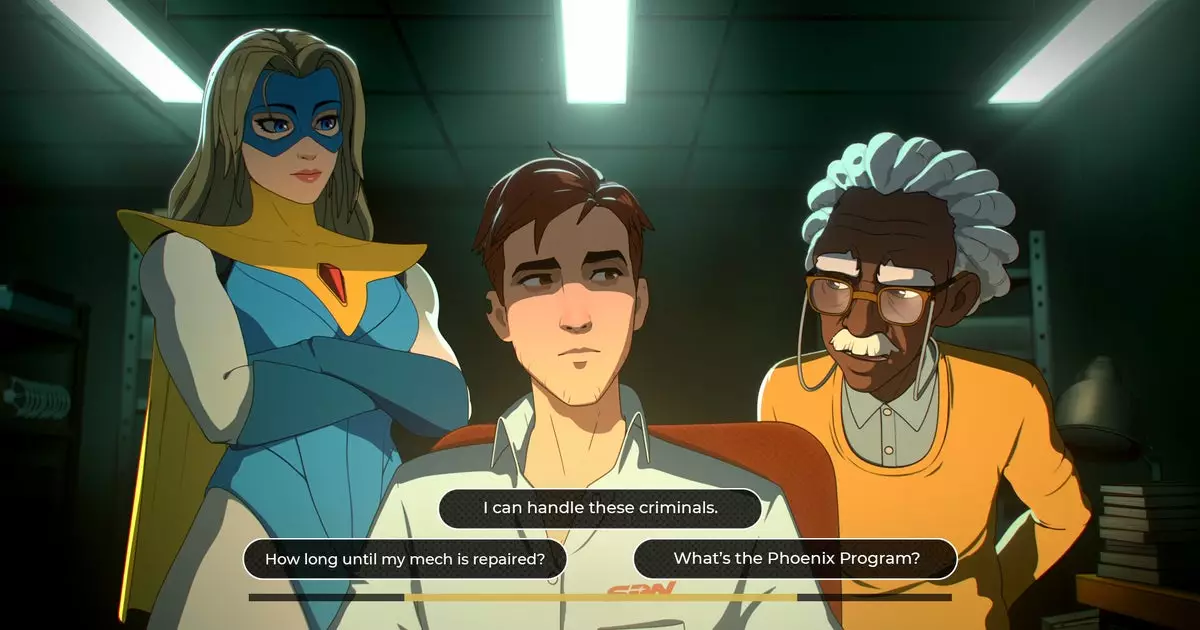In a gaming landscape increasingly saturated with superhero narratives, “Dispatch” emerges as a breath of fresh air by turning conventional tropes on their head. Unlike many titles that focus on heroic ideals or epic battles against formidable foes, this visual novel blends light strategy elements with humor and a unique premise: managing a ragtag team of reformed supervillains. Each character, infused with both strength and peculiar flaws, provides endless possibilities for engaging narratives and unpredictable outcomes. The beauty of the concept is not just in its originality but in how it cleverly reflects our own tumultuous real-world dynamics, serving as a microcosm of society’s complexities.
A Bizarre Team of Characters
At the core of “Dispatch” is a vibrant cast, each with eccentric abilities that frequently lead to humorous mishaps. For instance, there’s a French assassin whose dance moves double as assassination techniques, a transformation-savvy batman who embodies a hilarious paradox, and even a golem who seems blissfully unaware of social norms. This mishmash of personalities is not just a gimmick; it simulates the reality of teamwork, where cooperation often faces the hurdle of individual quirks, creating a rich terrain for comedic storytelling.
What makes these characters shine are their distinctive voices, injected with personality thanks to notable voice actors. With Aaron Paul from “Breaking Bad” voicing the player-determined dispatcher, and actors from beloved series such as “Westworld” and “The Last of Us Part 2,” the vocal performances elevate the narrative, adding layers of charm and authenticity. The synergy between the characters encapsulates both humor and heartfelt moments, fostering engagements that resonate emotionally with players.
The Comedy of Errors
Yet, it’s within the chaos of managing these misfits that “Dispatch” truly thrives. Each level comes complete with its own challenges that require players to make strategic choices about who to deploy for various emergencies. While one mission might require a melodramatic rescue operation, another may demand the negotiation of a bar fight through unconventional methods, like drinking competitions. The result is often absurd and unpredictable, leaving players in stitches as they witness the aftermath of mismanaged and poorly executed decisions. In a way, these humorous failures mirror real-life situations where best-laid plans go awry, thus enhancing the player’s connection to the game.
Moments of inter-character banter amid crises lend an authenticity reminiscent of classic buddy comedies or ensemble sitcoms, intertwining the unpredictability of real friendships with lighthearted absurdity. However, the game’s wit walks a fine line; its ability to tread sensitive subjects could either endear it further to players or risk alienating its audience. The balance between comedy and respect for diverse identities remains precariously poised, and as players navigate jury-rigged moral choices, there’s a palpable sense of embracing the chaotic nature of human interactions.
Visual Flourishes and Narrative Engagement
A notable feature of “Dispatch” is its fluid animation and polished visual storytelling, echoing the craftsmanship seen in titles like “The Wolf Among Us.” Each scene flows seamlessly into the next, enriched by stylized graphics that draw the player deeper into its whimsical world. Players engage not only through choices picked in critical junctures, but also through animated vignettes that allow glimpses into characters’ backstories, ambitions, and personal conflicts. The interplay between decisions made during these engaging cutscenes and the consequential gameplay keeps players invested, creating a sense of agency that many narrative-driven games attempt but often fail to achieve.
Additionally, “Dispatch” intersperses nostalgic elements into the mix, with clever callbacks that evoke fond memories of Telltale games. The implementation of notifications that signal player choices reverberating in character relationships— “X will remember that”—reinforces the significance of decision-making, ensuring that players are acutely aware of their narrative influence.
In embarking on the journey with its ensemble of misfits, “Dispatch” holds the promise of delightfully chaotic immersion, wrapped in humor and governed by the ebb and flow of character dynamics. While some elements provoke cautious enthusiasm regarding how inclusivity is handled, the initial ripples of joyous encounters and laugh-filled scenarios leave one excited for the game’s full release. It’s an exhilarating venture that promises both depth and levity, and players would do well to keep it on their radars.

